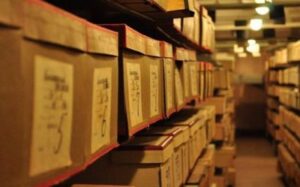
In 2025, the State Archival Service of Ukraine plans to implement a project to build an underground storage facility of one thousand square meters, said its head Anatolii Khromov.
“This is one of the biggest problems because almost all state archives are overcrowded. We usually solve the issue in such a way that even here in Kyiv we convert all free space for the storage of documents. All basements and cellars are dried, repaired and equipped for storage, thus finding new areas for relocated collections,” Khromov said in an exclusive interview withInterfax-Ukraine, answering the question of how acute the issue of overcrowding in archival storage is today.
At the same time, he said, the government has approved a strategy for protecting national identity, which deals with archives during the war. One of the points is about improving the material and technical base, that is, creating new areas for storage, including the construction of modern underground storage facilities.
Khromov said that in the near future it is planned to implement the project of the underground storage facility of the State Archival Service.
“As of today, we have updated the estimate documentation and conducted an expert examination, and there are assurances from the Ministry of Justice that they will help us find funds either in the budget plan or through donors to build it this year or at least put it into operation early next year. But, you know, the problem is not only money, it is a huge problem to find a contractor who can do professional work and who has a staff of non-mobilized workers,” he added.
In addition, he noted that, in addition to the ambition to complete the underground storage facility project, the plans are to complete the long-frozen construction of huge storage facilities that have not been built for more than 10 years.
“An underground storage facility of about a thousand square meters with all the equipment will cost about UAH 140 million. For two high-rise storage facilities, which are tens of thousands of square meters, together with the reconstruction of the existing premises where we were located, the amount was about $100 million before the war. The sums are quite large, but we are thinking of a phased implementation, because it is impossible to both build and find such a resource at the same time in the conditions of war, when the priorities of the state and society are obviously to support the defense sector,” added the head of the Ukrderzharkhiv.
In turn, Deputy Minister of Justice Viktoriia Vasylchuk emphasized that if the underground storage project is successful, it will significantly increase the protection of documents in the event of shelling or fire.
As reported, in 2022, Khromov said that Ukraine was the only post-Soviet country that had not built a new central archives complex.
In February 2025, he said that it was unrealistic to build underground storage facilities for the entire National Archive Fond for 100 million files.

The decision is the latest indication of the Trump administration’s move away from holding President Vladimir V. Putin of Russia accountable for crimes committed against Ukrainians.
The U.S. decision to withdraw from the International Center for the Prosecution of the Crime of Aggression against Ukraine, which is part of Eurojust, is expected to be announced on Monday.
The Justice Department has informed European officials that the United States is withdrawing from a multinational group created to investigate leaders responsible for the invasion of Ukraine, including President Vladimir V. Putin of Russia, according to a letter sent to members of the organization on Monday.
The decision to withdraw from the International Center for the Prosecution of the Crime of Aggression against Ukraine, which the Biden administration joined in 2023, is the latest indication of the Trump administration’s move away from President Joseph R. Biden Jr.’s commitment to holding Mr. Putin personally accountable for crimes committed against Ukrainians.
The group was created to hold the leadership of Russia, along with its allies in Belarus, North Korea and Iran, accountable for a category of crimes — defined as aggression under international law and treaties that violates another country’s sovereignty and is not initiated in self-defense.
“The U.S. authorities have informed me that they will conclude their involvement in the ICPA” by the end of March, Michael Schmid, president of the group’s parent organization, the European Union Agency for Criminal Justice Cooperation, better known as Eurojust, wrote in an internal letter obtained by The New York Times.
The group remains “fully committed” to holding to account “those responsible for core international crimes” in Ukraine, he added.
The United States was the only country outside Europe to send a senior prosecutor to The Hague to work with investigators from Ukraine, the Baltic States, Poland, Romania and the International Criminal Court.
A department spokesman did not immediately respond to a request for comment on Sunday night.
The Trump administration is also reducing work done by the department’s War Crimes Accountability Team, created in 2022 by the attorney general at the time, Merrick B. Garland, and staffed by experienced prosecutors. It was intended to coordinate Justice Department efforts to hold Russians accountable who are responsible for atrocities committed in the aftermath of the full invasion three years ago.
“There is no hiding place for war criminals,” Mr. Garland said in announcing the organization of the unit.
The department, he added, “will pursue every avenue of accountability for those who commit war crimes and other atrocities in Ukraine.”
During the Biden administration, the team, known as WarCAT, focused on an important supporting role: providing Ukraine’s overburdened prosecutors and law enforcement with logistical help, training and direct assistance in bringing charges of war crimes committed by Russians to Ukraine’s courts.
The team did bring one significant case. In December 2023, U.S. prosecutors used a war crimes statute for the first time since it was enacted nearly three decades ago to charge four Russian soldiers in absentia with torturing an American who was living in the Kherson region of Ukraine.
In recent comments, President Trump has moved closer to Mr. Putin while clashing with Ukraine’s president, Volodymyr Zelensky — going so far as to falsely suggest that Ukraine played a role in provoking Russia’s brutal and illegal military incursion.
“You should have never started it,” Mr. Trump said in February, referring to Ukraine’s leaders. “You could have made a deal.” He followed up in a post on social media, calling Mr. Zelensky a “Dictator without Elections” and saying he had “done a terrible job” in office.
The Trump administration gave no reason for withdrawing from the investigative group other than the same explanation for other personnel and policy moves: the need to redeploy resources, according to the people familiar with the situation, who spoke on the condition of anonymity because they were not authorized to discuss the moves publicly.
Source: https://www.nytimes.com/2025/03/17/us/politics/trump-ukraine-invasion-accountability.html

In 2024, Ukraine increased its total imports of seeds of grains and oilseeds, sugar beets and vegetables to $381.3 million, which is 3.2% more than a year earlier, the press service of the National Research Center Institute of Agrarian Economics (IAE) reported.
According to the report, in 2024 Ukraine imported 8.6 thousand tons of grain seeds and 22.2 thousand tons of oilseeds totaling $302.3 million. Scientists noted that compared to 2023, the cost of imports of these crops decreased by 3.8%, but it is almost 2.5 times higher than domestic exports of seeds, which amounted to $122.6 million.
In addition, sugar beet seeds worth $50.1 million and vegetable seeds worth almost $28.9 million were purchased abroad.
“The volume of purchases of foreign-bred seeds of grains and oilseeds has been gradually decreasing since 2022, while imports of sugar beet and vegetable seeds have been on the rise for three consecutive years,” the scientists emphasized.
According to their information, in 2023, 727 tons of sugar beet seeds were imported for the amount of $32.8 million, and last year the volume of purchases of this type of agricultural products increased by 52.7% and amounted to almost 973 tons. At the same time, the price of sugar beet seeds in 2024 increased to $51493 per ton compared to $45117 per ton a year earlier.
According to the IAEA, the volume of imported seeds fully covers the needs of domestic farmers, as it will allow to allocate more than 300 thsd ha of farmland for sugar beet in 2025. For comparison, in 2023-2024, the area under sugar beet was 220-250 thousand hectares.
In addition, the value of imported vegetable seeds increased by 27.3% last year compared to the previous year and amounted to $28.9 mln. In physical terms, purchases increased by 17.2% to 945 tons.
“Thus, in 2024, due to the increase in the cost of purchasing sugar beet and vegetable seeds abroad, total seed imports increased by 3.2%. The increase in the cost of imports was largely due to the purchase of higher quality seeds and higher categories of additive and basic forms, which are traditionally several times more expensive than certified seeds of different years of certification,” the Institute of Agrarian Economics summarized.

Gold futures may rise in price to $3.2 thousand per ounce in the fourth quarter of this year amid increased demand for protective assets, according to analysts at Swiss bank UBS.
The previous forecast predicted an increase in quotations to $3 thousand per ounce, but futures overcame this mark last week.
The escalation of trade conflicts emphasizes the role of the precious metal as a safe haven asset, said UBS experts led by Wayne Gordon and Giovanni Staunovo. In their opinion, additional demand for gold will be spurred by fears of a recession in the United States.
“We continue to believe that the decision to have about 5% gold in the investment portfolio will be optimal from a long-term diversification perspective,” they wrote.
Meanwhile, DoubleLine Capital founder and chief investment officer Jeffrey Gundlach set an even more optimistic target price for gold at $4,000 per ounce.
“Gold is continuing the rally we’ve been talking about for several years now,” said the investor, who has been nicknamed the ”King of Bonds. – “I will make a bold prediction and say that gold will reach $4 thousand.
Gundlach added that he was not sure it would happen this year. At the same time, he noted that gold purchases by central banks are growing “on a very, very sharp trajectory,” and this is unlikely to change in the near future.
In his opinion, the probability of a recession in the US economy this year is about 60%.
April gold futures are little changed in price on Monday afternoon and are trading at $3002.8 per ounce. Since the beginning of the year, the price of gold has risen by 12.7%.
According to MarketWatch, in January 1980, at the height of a period of particularly high inflation in the United States, which exceeded 14%, gold prices reached $873 per ounce. Adjusted for inflation in today’s money, this amounts to about $3,580 thousand per ounce, according to Dow Jones Market Data.

PrJSC Novovolynsk Foundry (NLMK, Volyn region) plans to use its net profit in 2024 for development and working capital replenishment.
According to NLMK’s announcement that it will hold a remote general meeting of shareholders on April 18, the shareholders will review the reports of the management board, supervisory board and auditor for 2024 and make decisions based on the results of such reviews.
In addition, shareholders will approve the results of financial and economic activities for the past year and determine the distribution of profits. It is proposed not to pay dividends based on the results of last year’s work, and to use the net profit for modernization and renewal of fixed assets, development of the enterprise and replenishment of working capital. The amount of profit is not specified.
In addition, the shareholders will determine the main activities of NLMK, approve the work plan for 2025, and decide to terminate the powers of the chairman and members of the company’s supervisory board and elect new ones.
It is planned to give preliminary consent to enter into significant transactions.
NLMK specializes in the production of steel and iron castings for the machine building industry, as well as in the provision of machining services.
According to the third quarter of 2024, Dnister-M LLC (Lviv region) owns 86.6392% of the shares in Novovolynsk Foundry.
The authorized capital of the company is UAH 1 million 568.06 thousand, the par value of the share is UAH 0.25.

In 2024, “Insurance Company ‘ARX’ PrJSC (ARX, Kyiv) collected gross insurance premiums in the amount of UAH 4.280 billion, which is 15.94% more than a year earlier.
These statistics are available on the website of RA Standard-Rating on the update of the company’s credit rating/financial strength (reliability) rating at uaAAA according to the national scale in 2024.
Income from individuals increased by 13.20% to UAH 2.617 billion, and from reinsurers increased 2.2 times to UAH 14.268 million. Thus, at the end of 2024, the share of individuals in the insurer’s gross premiums amounted to 61.14%, and the share of reinsurers – 0.33%.
In 2024, insurance payments sent to reinsurers increased by 15.74% compared to 2023 – up to UAH 114.375 million. The ratio of participation of reinsurance companies in insurance premiums of IC “ARKS” practically did not change and amounted to 2.67% in 2024.
RA notes that net written premiums increased by 15.94% to UAH 4.166 billion, and net earned insurance premiums increased by 16.18% to UAH 3.895 billion.
The volume of insurance claims paid by the company in 2024 increased by 24.23% compared to 2023, to UAH 1.720 billion. Thus, the level of payments increased by 2.69 p.p. to 40.19%.
Profit from operating activities amounted to UAH 170.090 million, and net profit amounted to UAH 452.835 million.
As of January 1, 2025, the company’s assets increased by 17.70% to UAH 5.220 billion, equity showed an increase of 20.77% to UAH 2.633 billion, liabilities increased by 14.73% to UAH 2.587 billion, cash and cash equivalents increased 4.16 times to UAH 817.524 million.
The RA also reports that as of the beginning of 2025, the insurer made financial investments in the amount of UAH 2.922 billion, which consisted of government bonds and government bonds (81.76% of the investment portfolio) and deposits in banks with investment grade credit ratings (18.24% of the portfolio), which had a positive impact on the provision of liquid assets, which exceeded the liabilities of IC “ARKS” by 1.45 times.
“ARKS” Insurance Company is a part of the international insurance holding Fairfax Financial Holdings Ltd. The company has been a leader in the hull insurance segment of the Ukrainian market for 13 years.